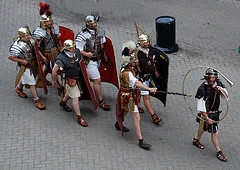 As a military commander, the centurion understood authority as a man who had it and was also under it, and thus he knew it when he saw it in Jesus. Thus, he “perceives that Jesus likewise both receives and exercises authority” (Elwell, 731), but unlike Roman imperial authority, Jesus “ministered under God's authority and as such was vested with the ability to heal diseases” (Howell, 118). In this we see that the centurion understood the relationship between obedience and authority, that is, those under authority obey those with authority, which is a principle that transcends human governance to the very subordination of the Trinity. However, the centurion also understood the limitations of authority, by means of who he was to obey and who was to obey him. For we certainly don't see the centurion commanding or ordering Jesus to heal his servant, though he could have tried as a Roman occupier of Palestine of which Jesus was a resident. Instead, he recognized that even nature itself was under Christ's authority (Matthew 28:18) and subsequently obedient to him (he may have heard about the healing of the Capernaum official's son) and thus his servant would be healed if Christ would but exercise His authority.
0 Comments
Leave a Reply. |
AuthorBrett Yardley: Categories
All
Archives
January 2019
|

